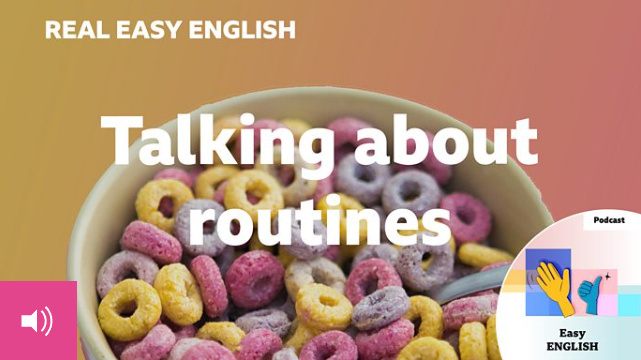Introduction
Neil and Beth have a real conversation in easy English about their meal times. Learn to talk about your routines and when you usually eat.
Vocabulary
routine
the time and way we usually do something
used to and would
used to talk about habits in the past
hangry
hungry and angry at the same time
brunch
eating breakfast and lunch at the same time
Transcript
Beth
Welcome to Real Easy English, the podcast where we have real conversations in easy English to help you learn. I’m Beth.
Neil
And I’m Neil. If you want to read along with this podcast, you can find a full transcript on our website: bbclearningenglish.com.
Beth
How are you today, Neil?
Neil
I’m very well, thank you, Beth. How about you?
Beth
I’m very good.
Neil
So what topic are we talking about in this episode?
Beth
OK, well, today’s episode is all about habits and routines. Now we talked about our favourite foods a few weeks ago. But today we’ll talk about our meal times and routines for eating.
Neil
Mmm… sounds good. What do we mean by a routine, Beth? Is it different to a habit?
Beth
Well, they are similar, but a habit is something we do regularly. So, for example. I eat an apple and a banana most days.
Neil
Ooh, very healthy.
Beth
Yeah!
Neil
A routine, though, is slightly different. It’s usually more about the time that we do something and the way we do something. So, I have my breakfast at six am every day.
Beth
OK, you said you have your breakfast at six am every day. What do you usually have to eat?
Neil
Well, usually I have something simple. A bowl of cereal, some toast with marmalade.
How about you, Beth?
Beth
I usually have porridge.
Neil
And what about lunch? What time do you have lunch, usually?
Beth
I normally have lunch at about one o’clock. What about you?
Neil
Yeah, the same. I don’t like it at 12. That’s too early. But by two, I’m getting a little bit hungry and angry at the same time.
Beth
There’s a word for that Neil. So if you’re hungry and angry, we can combine them and say hangry.
Neil
Yeah. So it’s important to have regular meal times, so you don’t get hangry.
Beth
That’s true. Now you’ve just reminded me of another word which is brunch. Now, that’s a combination of the words breakfast and lunch. Do you ever have brunch, Neil?
Neil
I love brunch, especially at weekends.
Beth
Yeah. When I was at university, I used to have brunch pretty much every day. So I would meet up with my friends and we would go to a cafe and we would have brunch.
Neil
Beth, you said that you used to have brunch at university. Used to – what’s that mean?
Beth
Well, used to is used to talk about a habit in the past, so something you did regularly in the past and don’t do now.
Now, another way of talking about past habits is to use would. So if you remember, I said I would message my friends and we would have brunch. So used to and would are both used to talk about past habits.
Neil
Do you ever miss a meal?
Beth
No. I think when I was at school, many years ago, I used to miss breakfast because I wanted to stay in bed. What about you?
Neil
I don’t like to miss meals because, like I said, I get hangry. But I guess I also used to miss breakfast when I was a teenager and I needed to sleep for a huge amount of time every night and get up really late.
Beth
Yeah, I think it’s quite normal and quite interesting how your habits change as you get older. For example, missing meals and that sort of thing.
Neil
Right, let’s recap the vocabulary we learned during the conversation.
Beth
We learnt routine, the time and way we usually do something.
Neil
We heard used to which we use to talk about a habit in the past and would, which we can also use to talk about past habits.
Beth
And my favourite brunch, which is eating breakfast and lunch at the same time.
Neil
We also heard a really new word in English, which is a combination of two words, hungry and angry. It’s hangry.
Beth
Thanks for joining us on Real Easy English. Visit our website for more activities and courses to help you with your English.
Neil
In the next episode we’ll be talking more about our hobbies.
Beth
See you, then. Bye.
Neil
Bye!
